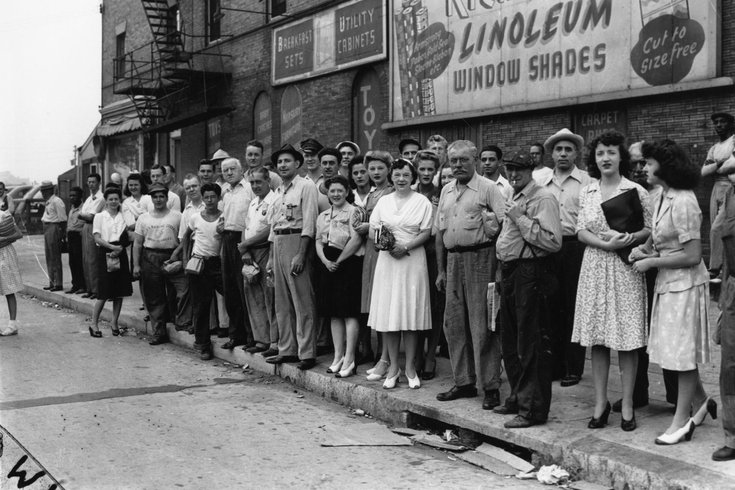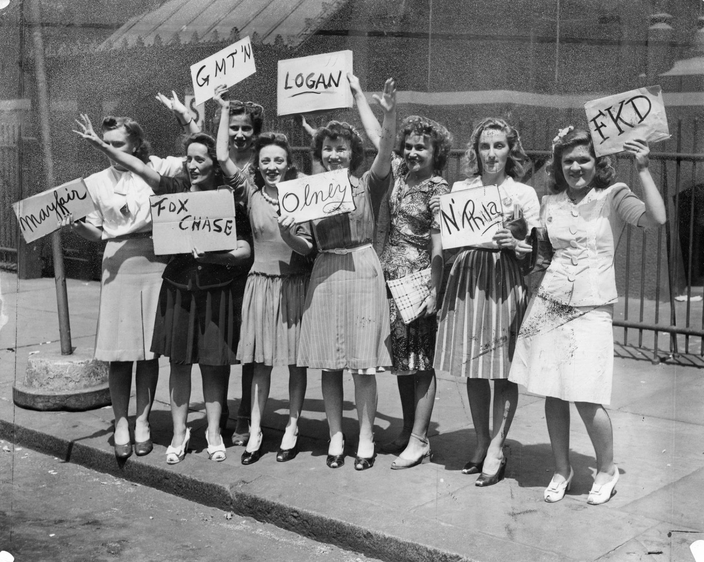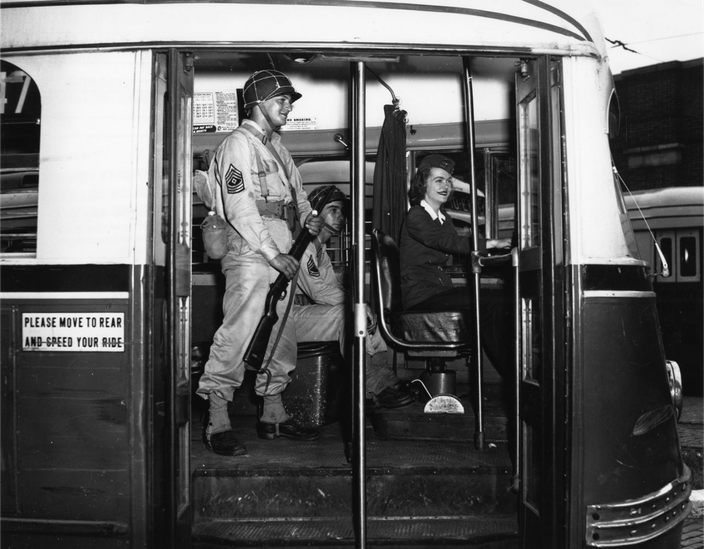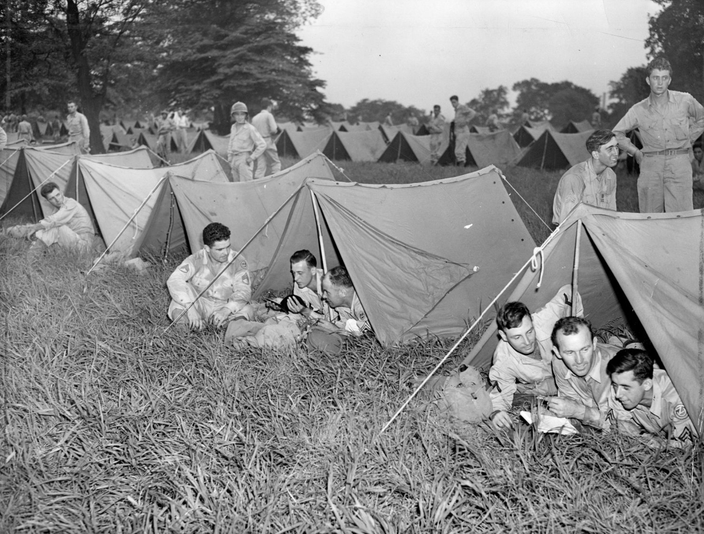
August 01, 2024
 Courtesy of/Special Collections Research Center. Temple University Libraries. Philadelphia, PA
Courtesy of/Special Collections Research Center. Temple University Libraries. Philadelphia, PA
The 1944 transit strike left workers across Philadelphia stranded. Commuters hitchhiked, took taxis and even roller-skated to get to their jobs.
The scene on the streets of Philadelphia 80 years ago was a chaotic one. People crowded the sidewalks in search of trucks, cabs or friendly drivers who would take on a hitchhiker. Some held signs with their destination. Others gave up on traditional vehicles, hopping on motorcycles or lacing up roller skates.
Why were all these people scrambling for a ride? The city's transit system had collapsed for nearly a week in the summer of 1944 as workers walked off the job to stand in the way of racial progress. Their strike would not only derail the daily lives of Philly residents, but impact war production — prompting President Franklin D. Roosevelt to call in the National Guard.
In August of 1944, the city's trolleys, buses and subway system were controlled by the Philadelphia Transportation Company, a forerunner to the Southeastern Pennsylvania Transportation Authority. (SEPTA took the reins the 1960s.) The PTC employed 11,000 people, but its drivers had historically been white, a policy the company clung to even after Roosevelt signed executive orders banning racial discrimination in the war industry and establishing a commission to enforce fair employment. The 537 Black people the PTC did employ, according to Temple University Libraries, had never held a "highly skilled job" and were stuck instead in custodial or labor-intensive roadway positions. Only after significant pressure from the White House and union elections did the PTC agree to open its conductor and operator positions to everyone. Eight Black men were promoted to trolley drivers.
This rankled several white employees, who believed the promotions would compromise their own advancement. According to historian Doris Kearns Goodwin, a crowd of 3,000 PTC workers rallied against the promotion of their Black colleagues on the night of July 31, declaring conducting "a white man's job." Bigoted handbills urging employees to strike and "refuse to teach the Negroes" circulated, along with an inflammatory fake message from FDR to his wife Eleanor Roosevelt: "You kiss the Negroes and I'll kiss the Jews and we'll stay in the White House as long as we choose."
Women at Broad and Filbert streets seeking a ride hold signs with their destinations.
The next morning, the strike began. As the Inquirer wrote, 4,500 PTC employees called out sick before "flatly admitting they were protesting against the employment of Negroes as trolley operators." The mass walkout, which commenced at 4 a.m., brought all transit vehicles to a halt by that afternoon. The strikers said they would not relent until their eight Black colleagues lost their new positions.
The shutdown of the transit system was naturally a problem for city commuters, but it was also a liability for the U.S. government. Philadelphia, with its naval shipyard, was at the time the third-largest city for war production in the country. Factories and government depots reported 10-50% employee absenteeism on the first day of the strike, immediately putting the work stoppage on the president's radar. Emergency vehicles rolled out to transport some of the stranded war workers, and various military and government officials attempted to negotiate with the strikers. The U.S. war effort hoped for a quick end, even as food packages meant for prisoners of war piled up and blood donation appointments were canceled.
But the work stoppage continued the following day and the next. Attempts to restart trolley lines with volunteers failed. Fearing unrest, the city attempted to curb any large, angry mobs by canceling a Phillies game and shutting down bars and liquor stores. (Many Philadelphians simply crowded Camden bars instead.) After three days of stalled trolleys and buses, FDR authorized national troops to seize control of the Philadelphia transit system.
Soldiers ride at the front of a trolley car on Aug. 5.
The troops rolled into town over the weekend, setting up tents in Fairmount Park. According to Temple, the soldiers initially served more of a support role, riding along in transit vehicles to protect the workers willing to operate them. But as transportation delays continued, the U.S. Army issued an ultimatum: Return to work, or lose your job, unemployment benefits and draft deferment. Regular transit service would resume Monday, Aug. 7, with or without the striking workers.
Soldiers rest in pup tents in the park.
The rest of Philadelphia had little sympathy for these workers. An editorial that ran in the Inquirer on Aug. 2 called the action "wholly indefensible and thoroughly un-American." Several reader letters echoing these sentiments ran in the next newspaper, with one writer labeling the strike "close to treason." Printed letters against the strike outnumbered those in favor by 10-1.
Despite the tensions, violence was apparently minimal during the six-day work stoppage. In a field report, civil rights activist Clarence Mitchell Jr. complained that rumors of unrest were, if anything, exaggerated, pointing to false claims about riots and murders of transit workers.
"Unquestionably the strike was an explosive issue in the Negro community," he wrote. "A feeling of deep resentment was expressed on every hand and it was not difficult to hear numerous arguments on this score. However, there was a tendency of out-of-town newspapers to exaggerate the possibility of racial outbreaks. ... It is true that some persons were arrested for actions growing out of their feelings about the strike but the majority of those responsible were not involved in any unusual disorders. Nevertheless some newspapers tried to make it appear that every group of Negroes arrested were persons trying to start a race riot."
Most PTC employees returned to work by the Monday deadline, though not the eight Black trolley drivers. They would not resume their training until later in the week, after operations were once again running smoothly. By September, seven were operating trolleys. The following month, there were twice as many Black drivers on Philadelphia transit vehicles, powering the city through the last year of the war.
Follow Kristin & PhillyVoice on Twitter: @kristin_hunt
| @thePhillyVoice
Like us on Facebook: PhillyVoice
Have a news tip? Let us know.
 Courtesy of/Special Collections Research Center. Temple University Libraries. Philadelphia, PA
Courtesy of/Special Collections Research Center. Temple University Libraries. Philadelphia, PA Courtesy of/Special Collections Research Center. Temple University Libraries. Philadelphia, PA
Courtesy of/Special Collections Research Center. Temple University Libraries. Philadelphia, PA Courtesy of/Special Collections Research Center. Temple University Libraries. Philadelphia, PA
Courtesy of/Special Collections Research Center. Temple University Libraries. Philadelphia, PA